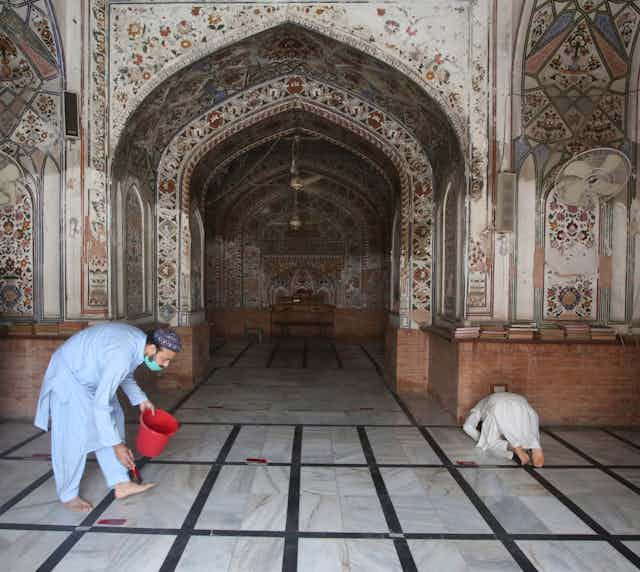The outbreak of COVID-19 has left governments scrambling for resources and forcing them to take measures to contain its growth. The Pakistani government has also taken such steps, including instituting partial lockdowns, cancelling international flights and closing schools.
Although these measures are controversial, it is the government’s decision to restrict access to mosques that has attracted outsized attention and intense debate.
The state’s decision to limit mosque gatherings to no more than five people provoked strong reactions from several leading ulema (religious leaders and scholars) in Pakistan. Many were initially defiant, but later negotiated with the government.

The negotiations and ensuing compromise between the ulema and Pakistani government authorities are signs of the tensions that exist between Islamist political thinking (presented and argued in theological language) and secularized reasoning that doesn’t rely on otherwordly claims to explain a phenomenon. What the ulema or other Islamists of different stripes aspire to (notwithstanding differences in their method) is a state and society ordered around God’s law.
These negotiations between the ulema and the government authorities led to the easing of restrictions, allowing mosques to remain open if they implemented social-distancing measures. The ulema have since assured the state that they are maintaining these rules.
Reaction and counter-reaction
The initial reaction of the ulema to the state’s decision and the ensuing compromise generated widespread debate and disapproval. But the compromise is also supported by the followers of these leaders.
Pakistan’s leading English daily, Dawn, wrote a scathing editorial, noting that the ulema were being unreasonable in their insistence to keep the mosques open.
Some have contended that the ulema’s objection has less to do with theological injunctions and more to do with the ulema’s fear of dwindling charitable contributions if the mosques remain closed.
Others have argued that the ulema reacted to protect their turf when the government tried to intervene in the internal affairs of religion.
Historically, the state has had a hard time countering Islamists because of their enormous street power and effectiveness as a pressure group. Since Pakistan’s independence in 1947, Islamic discourse, reasoning and cultural norms have become more commonplace, effectively giving more space to religious leaders, Islamist political actors and extremist groups.

Theism and modern culture
While the economic and political factors explain the intensity of the reaction, one element that has been ignored is the broader ideological conflict between traditional theistic thought and modern culture.
Commenting on the fate of traditional theism in late Victorian Britain, philosopher Alasdair MacIntyre noted that secular culture, which was becoming less beholden to theism’s hegemony, created a series of crises for theism.
For MacIntyre, theism relied on a pre-scientific logic and rationale that its proponents conveyed in religious or transcendental language. By contrast, those who identify with secular culture makes claims in a language that is scientifically explainable. Therefore, the vocabulary used by one group is often absent in the worldview of the other. Their ways of arguing are often irreconcilable.
In other words, theism is challenged from the perspective of an emergent, secular culture that claims to prize reason and devalues dogma and pre-scientific, faith-based reasoning.
Confronted with such a crisis, theism had to respond. One response was to refuse to reformulate theism in the image of modern thought. This was achieved through secluding itself from modern culture by “renouncing and denouncing contemporary secular culture as a false culture.”

Although theism is seldom overtly challenged in Pakistan, the English-speaking intelligentsia has been critical of the ulema’s reaction to COVID-19. On the other hand, a prominent Pakistani clergyman, Mufti Muneeb-ur-Rahman, went so far as to say that the criticism of the ulema was actually a negation of religion, prayer and an attempt to empty the mosques.
Muneeb-ur-Rahman and others like him were attempting to refute and reject the progressives’ claim to superiority. They refused to reconceptualize religion on the terms set by Pakistani progressive culture.
In my view, the fragmentation of culture in the postmodern era means that the progressives and theists have carved out subcultures for themselves, where crosscurrents and intellectual exchanges are rare. More often than not, segments from these subcultures talk at cross purposes, each guarding its own narrative. It is for this reason that the ulema are often trying to convince their own target audience, for instance, by exhorting followers to attend the Friday prayer in even greater numbers.
The ulema’s authority is derived from religion. They have a sizeable influence in Pakistan. The conflict between religious and non-religious authority means that, at least for traditional theists, ulema are in the right. Thus, Pakistani Muslims are quick to justify why the ulema are right because they view Islam as already under attack from more secular-minded Muslims.
While some argued that several Muslim states have closed the mosques (including Saudi Arabia’s closure of the two holy mosques), both the ulema and their followers argued that banks and supermarkets are also open, so why not mosques? In reality, this was a way to counter the charge that their demand to open mosques was unreasonable.
More importantly, criticism of the ulema or self-reflection rarely germinates within the subculture of Islamist thought. The ulema and Islamist political actors are considered bastions of a yet-to-be-realized Islamic society. And in Pakistan, theism is often viewed as under threat and perpetual war by forces of “unbelief”.
Any open criticism of the ulema from within the rank and file is seen as undermining the larger project of further Islamizing the Pakistani state and society. Since traditional theism can condemn Pakistani liberal thought as “false culture,” it only really needs to convince or address members of its own audience.

